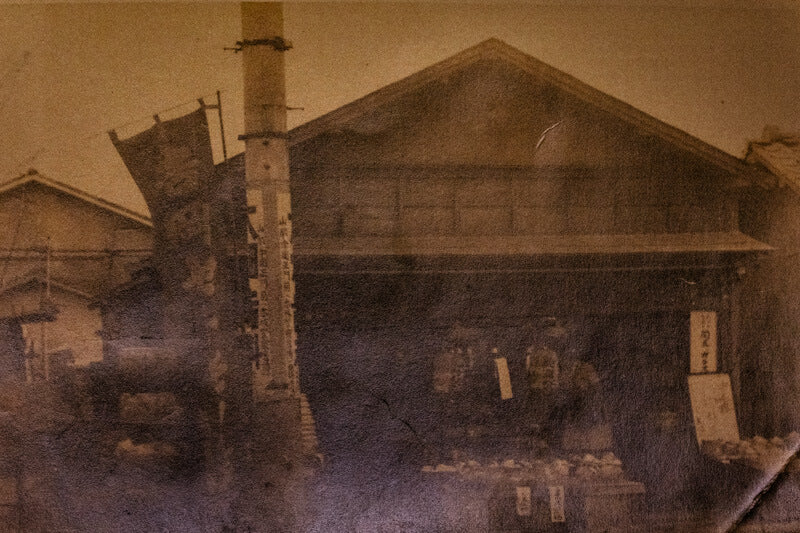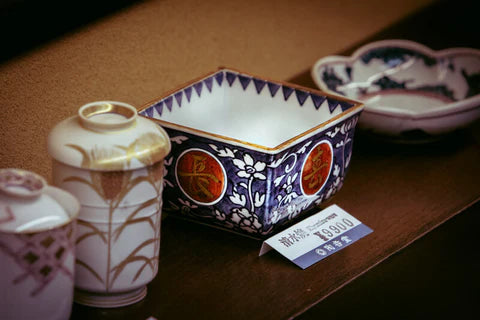
Founded in 1936 by Sumio Yoshioka, Tokodo is a family-run beacon of Japanese ceramics, nestled in the vibrant streets of Akasaka. Personally curated by the Yoshioka family, this emporium features the finest tableware from all over Japan, especially cities renowned for their artisanal prowess such as Kyoto and Ishikawa. Bestowed with the Royal Warrant in 1949, Tokodo has adorned over 20,000 royal events with its exquisite pieces. Nonetheless, its charm extends beyond regal realms and enchants both households and professionals alike, featuring as a popular choice in gifts for special events.
Recently, Kyomi had the privilege of delving into the world of Soichiro Yoshioka, Tokodo’s visionary business representative and grandson of its founder. We asked him about the joys and tribulations of managing a family legacy, how Tokodo has evolved over the years, and the wisdom gleaned from steering his company. Join us in exploring the inner workings of this illustrious ceramics haven.
Tokodo and Social Change

Amidst the serene aisles of Tokodo, where each ceramic piece gleams with a museum-like story, one can easily envision a clientele of emperors and princesses. However, when asked about Tokodo’s clientele, Mr Yoshioka reveals that it consists mostly of corporate clients such as restaurants and ryotei (料亭) — traditional restaurants historically associated with professional meetings, geisha performances, and by-invite-only entry. In the sophisticated neighborhood of Akasaka, known for its museums and top-rated nightlife, ryoteis have played a significant role in its cultural tapestry, and their history is intimately entwined with the development of Tokodo. “When ryotei restaurants were prosperous, they were busy from 5:00 or 6:00pm, and I used to see employees going over there to deliver missing glasses or plates,” Mr Yoshioka reminisced. “Originally, there were many ryotei restaurants in Akasaka, about 100 big and small ones, but now there are only about one handful.”
This evolution resonates in the changing dynamics of Japanese families. For individual consumers, Mr Yoshioka has observed a shift in consumer behavior that mirrors the shrinking size of Japanese households. “Most of our products for individual customers now cater to the nuclear family,” he remarked. “In the past, we sold almost all of our tableware in sets of five. But that is no longer the case. We are now selling almost all of our tableware in single pieces and by the bulk to meet the changing needs of our customers.” This adaptation is not just a response to domestic changes but also to the growing popularity of Japanese tableware on the global stage. “Since the number of inbound customers is increasing, we try to stock items that are likely to be liked by foreigners, and if it works well, we may add more items to the series,” Mr Yoshioka said.
For restaurateurs, Tokodo offers a canvas of customization, blending their culinary vision with unique ceramic creations. Tokodo considers their budget, decides on pieces that would complement the restaurant, and makes one-of-a-kind creations to adorn their food. “If you’re a restaurant owner and you go to a sushi restaurant, and you see the same plates everywhere you go, you might say, "We want to make something special”. We can do that kind of thing at low cost,” Mr Yoshioka said. Indeed, besides restaurants within Japan such as Sushi Miyazono and Kaiseki Tsujidome, Tokodo has partnered with a wide variety of foreign restaurants, supplying them with the finest works of Japanese craftsmanship. If you enjoy Japanese restaurants with a flair for beautiful tableware, you may have even seen a piece or two.
Running the Family Business

Continuing the legacy of an 88-year-old family business is no mean feat, but Mr Yoshioka handles it with grace and confidence. His childhood, steeped in the legacy of his grandparents, was a prelude to his eventual stewardship of Tokodo. “I lived with my grandparents for a long time when I was little, and they told me that I was going to inherit the store,” he told Kyomi. “But my parents never told me that directly. So my intentions were, until I entered the company I would do as I pleased.” Reflecting on his work in the US, where he lived for three and a half years, as well as his experience in various industries, he brings a rich tapestry of knowledge to the business. “My brother is more of a craftsman, and he knows a lot about [ceramic production]. He knows a lot about history, too,” he explained. “So we separate the business side of things with the artisanal side of it, and I handle the business side.” This symbiotic relationship between the business and artisanal aspects of Tokodo is a clear testament to the balance between tradition and modernity they have perfected.
Mr. Yoshioka spoke candidly about the complexities of a family-run enterprise. Despite sharing a unified vision for Tokodo’s future, he acknowledged the daily dance of differing opinions. “Even though it is a family-run business, we still need to have a bird's eye view of the company, or rather, of our private life,” he detailed. “I don't want us to mix our private and public lives.” This philosophy extends to maintaining a professional equilibrium with his brother, especially during familial gatherings. “Especially since my parents are with us, we have family gatherings during the New Year and New Year's holidays. So we’re always together throughout the year,” he said. “So regardless of whether we’re in the office or at a restaurant, I try to tell myself to be a little more relaxed.”
Our journey through the world of Tokodo and the insights of Soichiro Yoshioka weave a narrative of resilience, adaptation, and the enduring legacy of Japanese ceramics. As we step back from its gleaming tableware, we carry with us a story of a family's devotion to craftsmanship, the rhythmic pulse of tradition, and the evolving cadence of modernity. In the hands of the Yoshioka family, Tokodo stands not just as a store, but as a testament to the timeless sophistication and cultural significance of Japanese ceramics.



